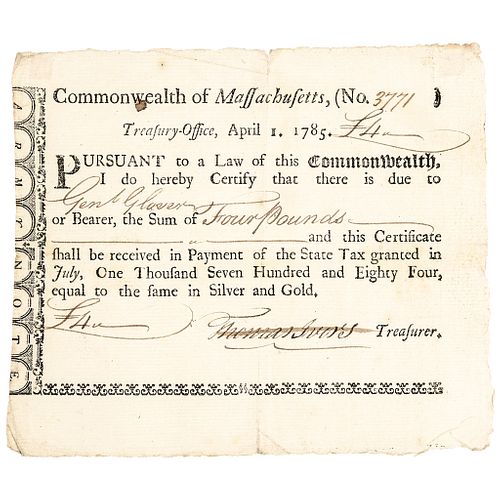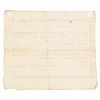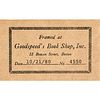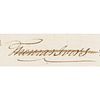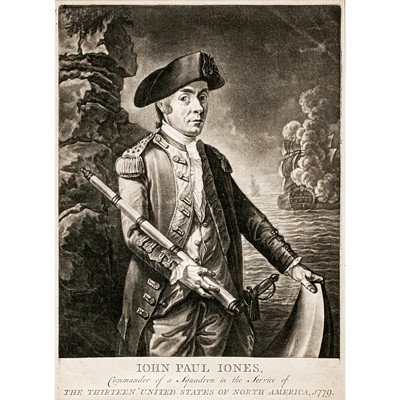GENERAL JOHN GLOVER Revolutionary War Era Mass Treasury Payment Certificate
Lot 23
Categories
Estimate:
$3,000 - $4,000
Absentee vs Live bid
Two ways to bid:
- Leave a max absentee bid and the platform will bid on your behalf up to your maximum bid during the live auction.
- Bid live during the auction and your bids will be submitted real-time to the auctioneer.
Bid Increments
| Price | Bid Increment |
|---|---|
| $0 | $10 |
| $200 | $20 |
| $300 | $25 |
| $500 | $50 |
| $1,000 | $100 |
| $2,000 | $200 |
| $3,000 | $250 |
| $5,000 | $500 |
| $10,000 | $1,000 |
| $20,000 | $2,000 |
| $30,000 | $2,500 |
| $50,000 | $5,000 |
| $100,000 | $10,000 |
| $200,000 | $20,000 |
| $300,000 | $25,000 |
| $500,000 | $50,000 |
About Auction
By Early American History Auctions
Jan 23, 2021
Set Reminder
2021-01-23 12:00:00
2021-01-23 12:00:00
America/New_York
Bidsquare
Bidsquare : Early American History Auction of Autographs, Americana, Political & Maps
https://www.bidsquare.com/auctions/early-american-history-auctions/early-american-history-auction-of-autographs-americana-political-maps-6311
311 Lots of Rare, Historic Autographs, Americana, Civil War Era, George Washington, Abraham Lincoln, Slavery & Black History, Revolutionary War Era, Colonial America, Federal Period, War of 1812, Colonial Currency, Indian Peace Medals & more... Early American History Auctions auctions@earlyamerican.com
311 Lots of Rare, Historic Autographs, Americana, Civil War Era, George Washington, Abraham Lincoln, Slavery & Black History, Revolutionary War Era, Colonial America, Federal Period, War of 1812, Colonial Currency, Indian Peace Medals & more... Early American History Auctions auctions@earlyamerican.com
- Lot Description
Autographs
Revolutionary War General John Glover's Continental Army "ARMY NOTE" Payment of His Massachusetts Marblehead Fishermen Militia Troops Rowed and Ferried General George Washington's Army Across the Delaware
(GENERAL JOHN GLOVER) (1732-1797). American fisherman, merchant, and military leader from Marblehead, Massachusetts who served as a Brigadier General in the Continental Army during the American Revolutionary War.
A very rare Massachusetts Treasury payment Partially-Printed Document... to none other than the famous Continental Army General John Glover, the leader of his Marblehead fishermen militia of the Continental Army. Accompanied by a prior framing provenance to: Goodspeed's Book Shop. Inc, Boston, dated 10/21/1980. April 1, 1785-Dated Post Revolutionary War, Commonwealth of Massachusetts, Treasury Certificate, 4 Pounds. Anderson MA-36, Choice Very Fine. This being an "ARMY NOTE" Issued to the historic Revolutionary War General John Glover "Genl. Glover" (Not Signed). Partially-Printed Document, 1 page, measuring 5.25" x 6". See: Early American Finance Author William Anderson lists this on page 140, as being Low Rarity-7 (7 to 12 Existant) as listed in his reference book titled: "The Price of Liberty". Indented border at left with "ARMY NOTE" printed vertically within the margin design. Signed by Thomas Ivers, as Treasurer paid by Taxs raised in 1784. Expected folds and two small old mounting remnants on the blank reverse upper corners, overall very clean and well printed.
John Glover (November 5, 1732 - January 30, 1797) was an American fisherman, merchant, and military leader from Marblehead, Massachusetts, who served as a Brigadier General in the Continental Army during the American Revolutionary War.
Glover was born in Salem, Massachusetts, the son of a house carpenter. His father died when he was four years old, and shortly thereafter his family moved to the nearby town of Marblehead. As a young man, Glover became a cordwainer and rum trader and eventually a ship owner and merchant. He married Hannah Gale in October 1754.
Following the Boston Massacre in 1770, Committees of Correspondence were formed. Marblehead elected Glover along with future revolutionists Elbridge Gerry and Azor Orne to committee posts. After the First Continental Congress passed the non-importation agreements sanctioning trade with the British, Glover was elected to enforce the embargo as a member of the committee of inspection.
Glover was active in the militia for many years before the Revolution, with his earliest service dating back to 1759.[5] In 1775 he was elected lieutenant colonel of the 21st Massachusetts Regiment from Marblehead, and became commander of the unit after the death of Colonel Jeremiah Lee in April 1775. Glover marched his regiment to join the siege of Boston in June 1775. At Boston, General George Washington chartered Glover's schooner Hannah to raid British supply vessels, the first of many privateers authorized by Washington. For this reason the Hannah has been called the first vessel of the United States Navy.
The Marblehead militia or "Glover's Regiment" became the 14th Continental Regiment. This regiment became known as the "amphibious regiment" for their vital nautical skills. It was composed almost entirely of fishermen.
After Washington lost the Battle of Long Island in August 1776, Glover's Marbleheaders evacuated the army to Manhattan in a surprise nighttime operation, saving them from being entrapped. In subsequent actions of the New York campaign the regiment fought well against the British at Kip's Bay and Pell's Point. The last action of the regiment was its most famous: ferrying Washington's army across the Delaware River for a surprise attack at Trenton on the morning of December 26, 1776. The regiment was disbanded as enlistments expired at year's end.
Glover went home to tend to his sick wife and look to business affairs. He turned down a promotion to brigadier general in February 1777, but rejoined the war after a personal appeal from General Washington. He served in the successful Saratoga campaign in 1777 and the failed Battle of Rhode Island in 1778. He was stationed along the Hudson River for the remainder of the war, guarding against British moves up the river from New York City.
Hannah, Glover's first wife, died in 1778. He married again in 1781 to Widow Frances (Hitchborn) Fosdick. He retired from the army in 1782 in poor health. Failing to secure a job with the U.S. federal government, he served in various local offices in his remaining years. He died in 1797 at age 64 in Marblehead, Massachusetts, after contracting hepatitis and was buried in Old Burial Hill (Marblehead, Massachusetts).
- Shipping Info
-
Early American provides in-house worldwide shipping. Please contact us directly if you have questions about your specific shipping requirements.
-
- Buyer's Premium



 EUR
EUR CAD
CAD AUD
AUD GBP
GBP MXN
MXN HKD
HKD CNY
CNY MYR
MYR SEK
SEK SGD
SGD CHF
CHF THB
THB